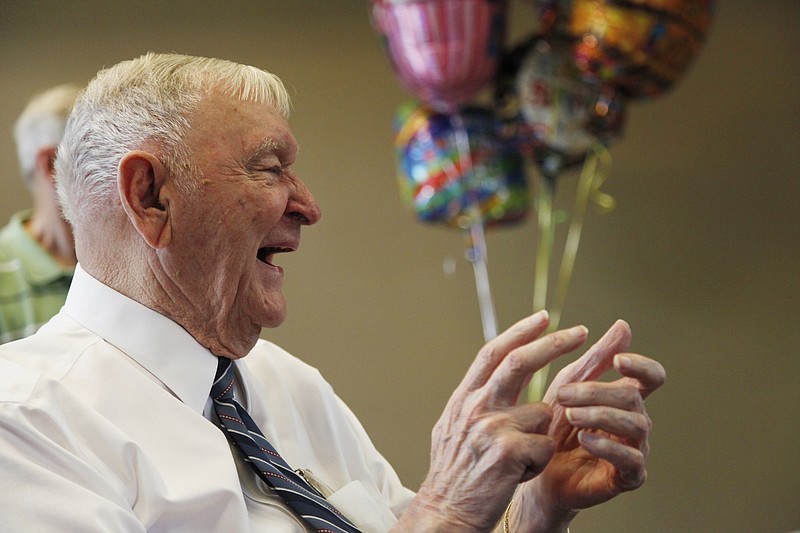I'm sorry, Mac, you've got to come and get me.
The clanking and grinding from the treads of two Nazi tanks stopped and brought a brief silence to what had been a bedlam of noise and confusion.
The lead tank's hatch popped open. A German officer emerged from the turret, looked a young American straight in the eye and in perfect English said, "You guys want to give up?"
The G.I. stood up, ramrod straight, meeting his opponent's stare and replied, "I'm sorry, Mac, you've got to come and get me." The hatch closed, the turret of the tank began to turn. The gigantic 88 mm barrel came to rest opposite the American, so close he could almost touch it. The life of a 23-year-old bookbinder from Signal Mountain was about to change forever.
Charles H. Coolidge was born Aug. 4, 1921, on Signal Mountain and was working for his father's printing business when he was drafted into the U.S. Army in 1942.
Raised during the Depression, he remembered being "neither rich nor poor." His father's business was one of the few companies in America who laid off no employees, instead cutting everyone's hours to as little as four per week so everyone would have some money to put food on the table. As the Depression ended, "things began to pick up." When the U. S. entered World War II, Charles was working as a binder at the family printing business.
Assigned to the 141st Regiment of the 36th Infantry Division, Coolidge and his unit fought their way across North Africa, through the Mediterranean and Italy and northward across France. Wet and chilled to the bone, Coolidge, now a technical sergeant, and his men were assigned on Oct. 24, 1944, to take a hill outside Belmont-Sur-Buttant, France, near the German border.
With his squad of 12 men, Coolidge scrambled up Hill 623 meeting no resistance. When he radioed back to headquarters, he was told to "secure the hill and dig in."
Soon a German platoon began to ascend Hill 623. As it neared, Coolidge told one of his men, fluent in German, to demand surrender. When the enemy responded by attempting to shoot his interpreter, Coolidge shot two Germans with his carbine. Their comrades responded with a burst of fire. The battle for Hill 623 was on.
Nazi reinforcements poured into the fight, virtually surrounding Coolidge and his 12 G.I.s. Coolidge was constantly on the move, going from foxhole to foxhole. He encouraged his men to throw as many hand grenades as possible, saying, "They can't come through that." In an effort to turn the tide, the Germans sent armor up the hill.
After refusing to surrender, the Chattanoogan found himself staring down the huge barrel of a German tank. The tank's cannon discharged but missed its target. Coolidge dodged from tree to tree, watching as the tank's turret revolved and fired five more shots at him at point blank range.
Spotting a bazooka on the ground, he grabbed it and advanced to within 10 yards of the tank, but the bazooka failed to fire. Coolidge threw more grenades. For four days, he and his squad held out against an overwhelming enemy force. When the fight was over, The Associated Press reported that Coolidge's men had killed 26 Germans and wounded 60.
Coolidge was nominated for and awarded the nation's highest award, the Medal of Honor, for "heroic and superior leadership throughout four days of continuous fighting against numerically superior enemy troops in rain and cold amidst dense woods." His motivation, Coolidge said, was protecting the lives of his men, many of whom were inexperienced replacements with limited training.
He arrived home to great fanfare. The city of Chattanooga declared Aug. 8, 1945, "Coolidge Day" and took out a full-page newspaper ad to make everyone aware of the festivities.
A 22-acre riverside city park would be named in his honor, although Coolidge preferred the name Veterans Park to honor all veterans of World War II.
Today, Coolidge Park is an iconic jewel in a revitalized downtown Chattanooga.
Coolidge would marry his sweetheart, Frances, shortly after his return. He would go back to the family printing business, Chattanooga Printing and Engraving, today run by his sons. Coolidge still resides on Signal Mountain and is Tennessee's only living Medal of Honor recipient.
Last Friday, a group of his friends celebrated his 95th birthday at the park named in his honor.
Dr. Anthony Hodges, a retired dentist, serves on the board of the Charles Coolidge Medal of Honor Heritage Center. Visit chattanoogahistoricalassoc.org for more information.
